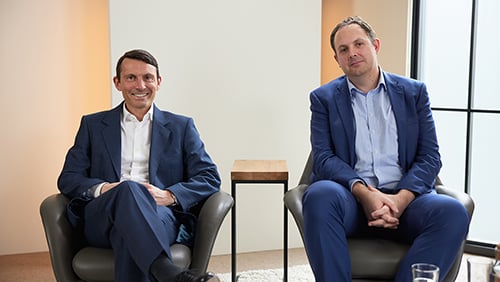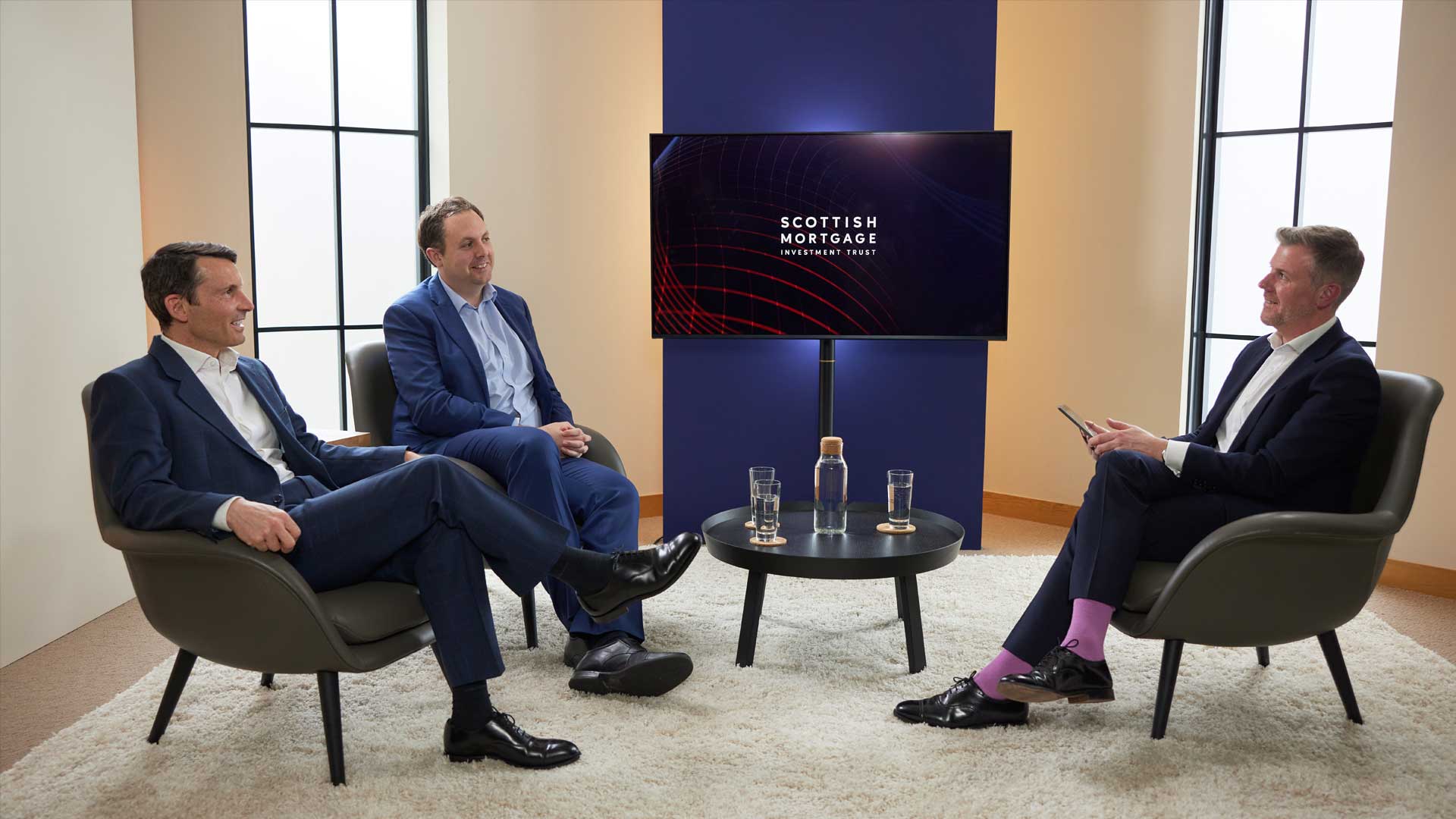Purpose not governance
James Anderson – Investment manager, partner
Companies with the most to contribute rarely score highest on corporate governance checklists. James Anderson, joint manager of Scottish Mortgage Investment Trust, argues that ill-defined ESG ratings and corporate policies can result in tragedy.

Illustration by the Craig Frazier
Please remember that the value of an investment can fall and you may not get back the amount invested.
This article originally featured in Baillie Gifford’s Autumn 2021 issue of Trust magazine.
It’s wonderful that fund managers have noticed that serious capital allocation extends beyond consideration of short-term financial returns. But opportunity is fast turning into tragedy. Morality cannot be outsourced. It has to be painstakingly won through deeply held but idiosyncratic investment philosophies and expressed through determined but rewarding efforts to select and influence individual companies. True long-term impact for the good of economies, societies and the Earth cannot be anchored in the diktats and banal mismeasurements of the ESG dogmatists, who have come to enjoy such unjustified influence.
Let’s try to explore this by an example. As readers will be aware, we’ve been a large and long-term shareholder, often the largest external shareholder, of Tesla. To paraphrase Elon Musk, he chose to build Tesla because it was the best way to combat the most serious issue facing the world. If he had just wanted to make money then making cars was not the easy way forward.
By now it is obvious to even the most myopic observer that Tesla has turned the automobile industry in an increasingly sustainable direction. It’s not just that Tesla itself replaces internal combustion engines but much more that it has forced change in a recalcitrant industry. Without Tesla the current transition would have been fatally later and slower – perhaps beyond a climate tipping point. Yet the standard metrics tell me that Tesla itself pollutes, has ill-defined future metrics and that it takes up a fair portion of Scottish Mortgage’s carbon exposure.
Now I think this is dangerous rubbish. If measure we must, then the relevant number isn’t the carbon Tesla expends, not even the gap between what it emits versus what a traditional manufacturer would, not just the driving emissions removed and pollution deaths avoided but all those plus the resultant benefits of its transformation of the rest of the industry. It’s all the electric vehicles made by others from VW to GM because Tesla changed the world. That’s the scale of the contribution.
If that’s Tesla’s role, what is ours? I think we can claim that without Baillie Gifford’s support and engagement Tesla’s success might have been even more difficult and less than assured. I don’t mean to sound vainglorious but we may have mattered. After all, at one prolonged and crucial point there were no other major institutional backers and few sources of finance amid the short-sellers’ onslaught. I’m sorry but I think this made more of a societal contribution than all the invisible ESG measures and pontificators have ever done.
But let’s go further. Tesla itself disobeys many governance metrics. From the board composition to incentive schemes to tensions with the SEC to Twitter radicalism, this is not a company to gladden ESG and voting advisor hearts.
Sometimes we have painfully clashed with Mr Musk in advocating deeper board oversight or greater restraint. At other times we’ve risked the wrath of right-thinking people by backing the company – on Musk’s huge but demanding incentives for instance. Whatever the issue though, to have influence you have to fight and earn a voice over years of ownership.
Now let’s take our example one final stage forward. I do not believe that Tesla would have changed the world for the better if it had been a normal company paying heed to the standard governance codes. For a company and a CEO so dependent on radical thought, so blindingly impatient of conventions and constraints, it’s hard to conceive that ‘normal’ behaviour would have been feasible or beneficial. Would a standard board have risked all on a revolution that came within weeks of disaster? Would Musk have survived the many moments of controversy? I doubt each of these. Now Tesla may be an extreme example but aren’t all companies that transcend the mediocre (and even the good) fundamentally unreasonable?
Tesla has turned the automobile industry in an increasingly sustainable direction

Or to, without any apology, repeat a quote from Noubar Afeyan, the chairman of Moderna, that I cited in the Annual Report: “We have to be willing to embrace unreasonable propositions and unreasonable people in order to make extraordinary findings because the notion that utterly reasonable people doing utterly reasonable things will produce massive breakthroughs doesn’t compute to me.”
We’ve often talked about the importance of identifying the few companies that can drive investment performance but it seems to me that this is even more imperative in matters of governance, or rather societal impact. The number of companies that truly possess the ability to change the world for what we trust is the better is vanishingly small, and a small subset of those that can drive investment performance. That we can have underwritten Tesla and kept Illumina independent from the clutches of the financial engineers at Roche masquerading as healthcare innovators is a source of real pride to us. But that we were slow to back Moderna, despite its endless courtesies to us, is a source of equally deep personal regret. But in aggregate to have helped confront the climate crisis and the pandemic is hopefully evidence enough of impact for good.
Out of cowardice I’ve left perhaps the most contrarian thought to last. It’s that ESG frameworks are not just gestures, not just ill-thought through metrics and distractions, but that in aggregate they are profoundly damaging to the prospect of changing the corporate sector – even the world – for the better. If we believe, demand and enforce a standard template for all companies, in all industries and in all countries then we will have an arid, unimaginative, fearful and rule book-driven world.
As Sir John Kay wrote some years ago, “Tolstoy claimed in Anna Karenina that ‘All happy families resemble each other, but each unhappy family is unhappy in its own way’. However, the opposite is true in commercial life. Unhappy businesses resemble one another: each successful company is successful in its own way. Business achievement depends on doing things that others cannot do.”
Or as John declared at a memorable Scottish Mortgage board lunch: you cannot enforce or legislate diversity, because true diversity stems from the unique combination of ingredients that only one company can achieve.
To take a simple, perhaps simplistic, example of universal current metrics, I’d much rather have one company leadership composed of six white male Old Etonians who matured (if that is the word) into Bullingdon Club membership and effortless supremacy and another, separate company, entirely composed of minorities than two companies that both evenly balanced these categories. For sure, I would much rather invest in the ‘diverse’ company. For certainly, it would be much more independent of mind.
As an aside, it’s amazing that more than 100 years after the suffragettes and Marie Curie’s double Nobel Prize wins, some companies still define female staff as ‘diverse’, despite women making up 51 per cent of the UK population. To repeat and conclude: what we desperately need is the courage to find our own less travelled paths to investment and societal progress, not the supine adherence to questionable and superficial metrics determined by others.
If you would like to register to receive Trust magazine please visit bailliegifford.com/trust

About the author - James Anderson
Investment manager, partner
James Anderson has managed Scottish Mortgage Investment Trust since 2000. James is a partner at Baillie Gifford and was a member of the Advisory Board of the Kay Review.
Important information
Investments with exposure to overseas securities can be affected by changing stock market conditions and currency rates. The trust has a significant exposure to private companies. The trust’s risk could be increased as these assets may be more difficult to buy or sell, so changes in their prices may be greater.
The views expressed in this article should not be considered as advice or a recommendation to buy, sell or hold a particular investment. The article contains information and opinion on investments that does not constitute independent investment research, and is therefore not subject to the protections afforded to independent research.
Some of the views expressed are not necessarily those of Baillie Gifford. Investment markets and conditions can change rapidly, therefore the views expressed should not be taken as statements of fact nor should reliance be placed on them when making investment decisions.
Baillie Gifford & Co Limited is wholly owned by Baillie Gifford & Co. Both companies are authorised and regulated by the Financial Conduct Authority and are based at: Calton Square, 1 Greenside Row, Edinburgh EH1 3AN.
The investment trusts managed by Baillie Gifford & Co Limited are listed on the London Stock Exchange and are not authorised or regulated by the Financial Conduct Authority.
A Key Information Document is available by visiting bailliegifford.com







